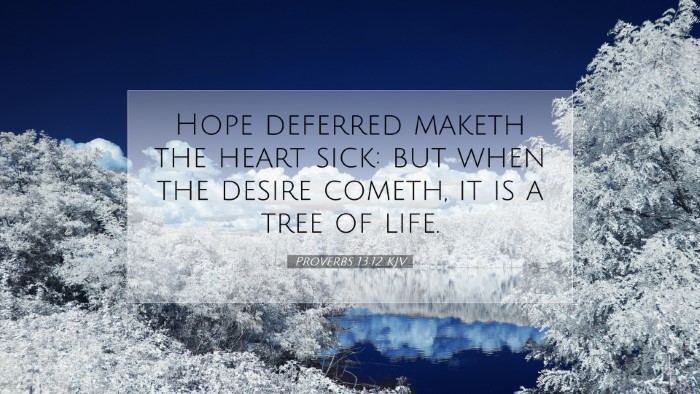Commentary on Proverbs 13:12
Verse: "Hope deferred maketh the heart sick: but when the desire cometh, it is a tree of life." (Proverbs 13:12)
Introduction
The verse from Proverbs 13:12 offers profound insights into the nature of hope and the human experience. As we explore the commentaries provided by esteemed scholars like Matthew Henry, Albert Barnes, and Adam Clarke, we aim to uncover the layers of meaning that this text presents. This commentary draws upon public domain sources to highlight theological reflections that resonate with pastors, students, and theologians alike.
Exegesis of the Text
At the outset, we must consider the two contrasting statements within the verse. The first part, “Hope deferred maketh the heart sick,” speaks to the anguish experienced when expectations are postponed. The second half, “but when the desire cometh, it is a tree of life,” contrasts this despair with the joy that fulfillment brings.
Matthew Henry’s Insights
Matthew Henry emphasizes the emotional turmoil associated with delayed aspirations. He explains that when hope is deferred—be it in spiritual matters, personal ambitions, or life circumstances—it leads to a sense of disillusionment and sadness. Henry illustrates that such deferral can weaken the spirit, causing a malaise that can affect the individual's entire outlook on life.
However, Henry also highlights the transformative power of fulfilled desires. He notes that when hope becomes reality, it revitalizes the soul. This “tree of life” metaphor is particularly significant; it symbolizes sustenance and vitality, suggesting that achieved desires provide spiritual nourishment and joy.
Albert Barnes’ Perspectives
Albert Barnes offers a complementary analysis focusing on the wider biblical context of hope. He asserts that hope is an essential component of faith—it urges believers to look beyond present circumstances and cling to God’s promises. Barnes elaborates on the consequences of hope deferred, connecting it to the spiritual struggles that arise when one’s faith appears to falter.
He states that deferred hope often leads to feelings of emptiness and disappointment. Yet, the contrast of the verse serves to uplift, reminding readers of the eventual fulfillment of God’s promises. Barnes encourages believers not to lose heart during periods of waiting, as the realization of hope can bring profound joy and spiritual rejuvenation.
Adam Clarke’s Commentary
Adam Clarke approaches the text with an analytical perspective, focusing on the psychological effects of longing and fulfillment. He points out that human nature is deeply affected by the expectations we cultivate, and prolonged desires can lead to a deep sense of despair. Clarke views this as a reminder of the human condition; our hearts are heavily impacted by what we long for.
Clarke also emphasizes the significance of the “tree of life” metaphor. He interprets it not only in a personal context but also in a communal sense, suggesting that fulfilled desires often yield benefits that extend beyond the individual. The joy of achieved hopes can produce a ripple effect, nourishing others in the community and fostering a sense of interconnectedness.
Theological Reflections
This verse invites believers to reflect on their relationship with hope and expectation. The tension between deferred hope and fulfilled desire can serve as a spiritual metaphor for understanding our journey with God. One must grapple with the reality of waiting, a common experience in the Christian faith. The journey of waiting can deepen faith, cultivate patience, and ultimately strengthen our relationship with God.
The transformative promise of fulfillment is therefore a central theme. The phrase “tree of life” points toward themes of restoration, renewal, and hope manifested in the life of Christ. Believers are reminded that ultimate hope is fulfilled in the person of Jesus, who embodies the fulfillment of God's promises.
Practical Applications
- Encouragement in Waiting: This verse can be a source of comfort for those enduring long seasons of prayer and expectation. Pastors might draw upon this during counseling sessions, encouraging congregants to remain steadfast in their faith despite the challenges of waiting.
- The Role of Community: The idea that fulfillment can ripple into the community stresses the importance of supporting one another. Church leaders can promote initiatives that inspire shared hope among congregants.
- Personal Reflection: Individuals should engage in personal reflection regarding their hopes, re-evaluating their expectations in light of Scripture. This can foster a more nuanced understanding of waiting and fulfillment in the context of faith.
Conclusion
Proverbs 13:12 provides a profound exploration of hope and fulfillment, drawing attention to the emotional dynamics of human life. Through the combined wisdom of Henry, Barnes, and Clarke, we uncover a multifaceted understanding that can enrich the lives of believers and guide them through the complexities of their spiritual journeys. In embracing both the challenges of deferred hope and the joy of its realization, we are reminded of the deeper narrative at play—the narrative of faith that invites us to trust in God's perfect timing.


